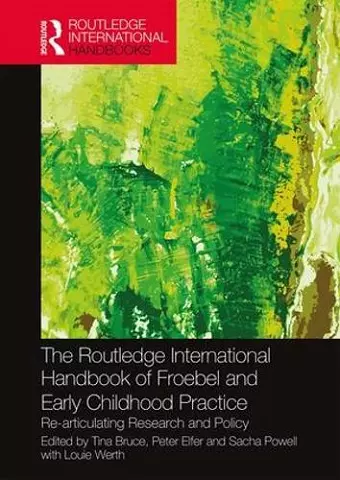The Routledge International Handbook of Froebel and Early Childhood Practice
Re-articulating Research and Policy
Tina Bruce editor Sacha Powell editor Peter Elfer editor Louie Werth editor
Format:Hardback
Publisher:Taylor & Francis Ltd
Published:1st Aug '18
Should be back in stock very soon

A major influence on the education of young children since the late nineteenth century, the philosophical and practical tenets of Frobelian early childhood education require urgent re-articulation in light of current debate and developments in research and policy.
This seminal Handbook responds to this need, drawing together a unique and valuable body of literature, research and case studies to make explicit the specific features of Froebelian education and provide key impulses for future research and practice in this area. Chapters present the sometimes divergent perspectives of leading educationalists, and so offer a uniquely comprehensive overview of Froebelian approaches and their interaction with contemporary policies and insights.
The Handbook explores five significant areas of scholarship and practice:
- Part I examines the original Froebelian principles and practices in early childhood education in different parts of the world.
- Part II presents case studies, development projects and practitioner publications exploring Froebelian approaches to early childhood education.
- Part III details research studies which document, debate and evaluate Froebelian approaches.
- Part IV considers how Froebelian approaches might be sustained and adapted for use in various cultural contexts across the world.
- Part V offers a re-articulation of research and policy.
An essential resource for in-service and future practitioners, researchers and policy-makers involved in early childhood education, this key text will promote discussion, aid analysis and further the practical application of Frobelian principles.
"This comprehensive, thought provoking, scholarly, yet immensely practical, International Handbook of Froebel and Early Childhood Practice, edited by Tina Bruce, with Peter Elfer, Sacha Powell and Louie Werth, draws together an international range of highly respected authors, each of whom has taken a critical and reflective approach to the legacy of Froebel and made an unequivocal case for its relevance to modern, contemporary societies. Individually, each chapter provides an insight into the past and present application of Froebel’s principles to professional practice, projects or research, but collectively they stand as a testimony of the continued contribution of this seminal figure’s work to the future development of early childhood education. As such this book provides a rich resource to be plumbed by all those currently pursuing a reflective and action oriented approach to research, practice and policy in early childhood education and care. I believe anyone who engages with this handbook will be inspired and motivated by Froebel’s work, who stretches his hand across the years through these chapters to challenge and extend our current and future thinking, offering a set of guiding tenets which will ensure we adopt a similarly moral and informed stance as we work to develop quality services for all children and families wherever we reside."
Professor Chris Pascal, Centre for Research in Early Childhood, UK
"The Routledge International Handbook of Froebel and Early Childhood Practice: Re-articulating Research and Policy is a magisterial collection of papers about the Froebelian tradition in education and its renewal over the last two centuries. It is surely significant that this volume documents how Froebelian practice has brought hope and renewal in some of the most challenging environments for children on earth. Jacqui Cousins’s account of her project with Romanian orphans, and the work of Tina Bruce and Stella Louis in the settler camps of Kliptown in South Africa, particularly stand out.
The Froebelian tradition is especially important in at least two respects.
It has developed through processes of reflection and renewal over the years, whilst staying true to the values and principles of Frederich Froebel. The past informs, but does not control, the present. Much of the handbook is concerned with today’s pressing issues: children’s emotional wellbeing, involving parents in their children’s education, and developing appropriate curricula for 21st Century life.
Secondly, the Froebelian tutors and educators connect with the people they work with, rather than imposing their beliefs and programmes. In Japan, South Africa and Romania, and in disadvantaged areas of the United Kingdom, the Froebelian approach is to develop respectful partnerships, to see communities and families as assets to treasure, not problems to solve.
Froebel wrote that "children are like tiny flowers: they are varied and need care, but each is beautiful alone and glorious when seen in the community of peers." This collection of papers tells of important histories of thinking, questioning and reflecting, and a truly glorious community of practice."
Dr Julian Grenier, Headteacher and National Leader of Education, UK.
ISBN: 9781138672628
Dimensions: unknown
Weight: 775g
354 pages